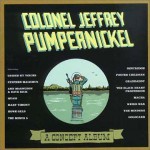 Various Artists
Various Artists
Colonel Jeffrey Pumpernickel – A Concept Album
Off Records
The idea of a ”concept “ album in pop music dates back to the Beatles’ Sgt. Pepper’s Lonely Hearts Club Band. Beatle John Lennon later refuted the whole concept notion, saying “It [Sgt. Pepper] doesn’t go anywhere… it worked because we said it worked.” Extended folk ballads of the 16th and 17th centuries, and oratorios and operas of the 18th and 19th, were probably the earliest concept musical works; and, thus, the first concept recordings. And while there were plenty of concept songs in pop music, even in the fifties: witness all the dead teenager songs of that period, such as Ray Peterson’s “Tell Laura” and Mark Dinning’s “Teen Angel,” there had never been an entire album where one song flowed to the next, thematically connected and musically related, in a complete work. Truthfully, Sgt. Pepper was not that album either.
Still, the Beatles’ real achievement (or supreme blunder) was to inspire a whole generation of musicians to attempt their own concept albums. Frank Zappa and the Mothers of Invention struck first in the Spring of 1968, with the raucous We’re Only In It For The Money. Satirizing the Beatles was the only concept the Mothers launched on that album, although Zappa would return, fifteen years later with his Joe’s Garage series, which pretty much killed off the concept album genre completely, for quite some time..
In the Fall of 1968 the Moody Blues released Days Of Future Passed, a vague, “day in the life” pastiche, which was structurally connected by songs, written around times of the day, ie “Tuesday Afternoon” and “Nights In White Satin,” etc. The scenario of the Bee Gees’ Odessa— released in the Fall of 1969, and an even vaguer work— seems to revolve around the tale of some doomed fellow in the 19th century, who recalls various moments in his life, while marooned upon an unapproachable iceberg.
The first real rock opera is considered by most authorities to be the Pretty Things’ S.F. Sorrow (based on a short-story by leadsinger Phil May, who, along with Dick Taylor, the original bassist for the Rolling Stones, were the prime Pretty Things), which was released in the UK in late 1968, in the US in early 1969; and which is thought to be the inspiration for Pete Townshend to create Tommy, which the Who released in the fall of 1969. Also in 1969, Ray Davies weighed in with the concept album The Village Green Preservation Society and, later in the year, with the rock opera Arthur. The Kinks followed that with Lola Versus The Powerman And The Moneygoround in 1970, as did Harry Nilsson in the same year, with The Point,.
Jethro Tull entered the concept album fray in 1971 with Aqualung, following that, in 1972, with the even more ambitious Thick As A Brick, and then with A Passion Play in 1973. In 1972 David Bowie, an artist whose entire career is a concept album, released Ziggy And The Spiders From Mars. The following year Pink Floyd released Dark, Side Of The Moon, as the Who released their second rock opera, Quadrophenia. In 1974 Genesis released The Lamb Lies Down On Broadway, Peter Gabriel’s final album with the band. By the time Pink Floyd released The Wall in 1979, well over one hundred rock operas and concept albums had been released by major labels alone, to varying degrees of commercial success.
It was with the full awareness of all of the above, that Chris Slusarenko conceived of this concept album. Slusarenko, who made his name locally with such bands as Cavemanish Boys, Sprinkler, Svelte and Death Midget, mobilized into service a cadre of national indie acts, such as Guided By Voices, Grandaddy, Stephen Malkmus, the Minus Five, Howe Gelb of Giant Sand, Mary Timony of Helium, Ann Magnuson and Dave Rick of Bongwater and Sentridoh, Lou Barlow’s Sebadoh spinoff; as well as several other bands.
In addition, Slusarenko tapped the services of Pond’s Charlie Campbell, here billed as Gold Card, to provide linking musical passages. Campbell who had all but retired from the music business, contributes melodic, electronically-enhanced guitar pieces, which act as sonic segues between the three acts in the play, as well as the prologue and epilogue. Other local acts, Quasi and the Minders make appearances as well.
Slusarenko, himself, only makes the briefest of musical appearances in the production, playing piano with Campbell in the short Prologue. Otherwise, Chris was the promulgator of the concepts involved in the creation of the project. He gave each band a vague synopsis of what their individual submissions were to represent and left it at that. From there, the various artists created what they wanted to create. None of the bands heard the others’ songs as each entry was submitted. Chris alone was the mastermind.
To complete the package, Slusarenko called on illustrators Peter Bagge, Jim Woodring Kim Deitch and Joe Sacco to furnish colorful individualized panels. Adrian Tomine designed the covers. In the final stroke of genius, Richard Meltzer, of Creem and Crawdaddy fame, was enlisted to write the liner notes.
The storyline, such as it is, appears to involve an Armageddon conflict between robots and animals. All we know of Colonel P. is that he often suffers from debilitating hallucinations and a fierce blue rash, symptoms of allergic reactions he has experienced since childhood. Beyond that, we are given vignettes in the life and death (and afterlife) of the Colonel, as well as occasional updates in the skirmish between the robots and the animals.
However, even after four months of repeated auditions, it remains near impossible to track an actual storyline here. In that regard, this album seems more like Sgt. Pepper than Tommy. More S.F. Sorrow than The Wall. Still, it is possibly the only concept compilation in existence and it is a collector’s item, if for no other reason than that. However, the music the bands contributed to this project is top-notch, And, taken strictly upon it’s musical merits alone, Colonel Jeffrey Pumpernickel is a great work.
Highlights among the 19 tracks are Guided By Voices’ urgent “Titus & Strident Wet Nurse.” Robert Pollard’s driving guitar pulses over a screaming siren tone, as he relates the initial clue to the story. Here, it appears that Jeffrey is conceived (if it is proven that he is indeed human) or created (if it turns out that he is a robot). Malkmus’ “Blue Rash Intact” is an incoherent feverdream allergic hallucination.
Magnuson and Rick’s “Dr. Mom” begins as a soothing waltz which floats peacefully by, until an emergency of some sort occurs, “keep moving ahead, keep moving ahead, keep moving ahead” Magnuson implores “keep moving ahead/ never look back/except once, when I recognize a withered and world-weary John Entwistle behind me/I must keep moving ahead/I must not stop.” A bear intercedes into the dream, chasing our heroine to “the highschool auditorium, perched on a beaver dam nearby/through the double doors, down the puke green corridor/through the classroom/running from the mother bear/she’s vicious, insane/she’s gonna kill me.” A nightmarish series of windows appear, to impede her escape from the mother bear.
Mary Timony’s eerie “Doom In June” captures a mood, layering various mellotron-like keyboard sounds over an insistent programmed beat. Meanwhile her angelic voice prophesies disaster. Appropriately, the Minus Five’s “The Great Divider” affords Scott McCaughey and crew the opportunity to indulge in the most profound of their Beatle fantasies— with a piece of work that is easily the equal of the Rutles or Klaatu. Lou Barlow and Sentridoh’s “Morning’s After Me” sounds like something from Donovan’s A Gift From A Flower To A Garden period. Poster Children’s restless “Back In Uniform” helps to re-energize the set, with a hard-driving anthem. “I’m back where I belong/I’m back in uniform.”
Hailing from Modesto, California, the almond capitol of the world, Jason Lytle has made a name for himself in the musical world as Grandaddy, with his latest release Sophtware Slump.” His contribution here is the gorgeously lush ballad “LFO.” Macha’s “ He Remembers His Burial At Sea” is a somber Indian-tinged raga drone, before the triumphant bagpipes come marching across the sonic landscape near the end of the song.
A classic blues send up, Weird War’s “I’ll Never Forget What’s His Name” plays like a funeral service for an anonymous corpse. The Minders close out the play with a hip instrumental theme, “Mandatory Rebirth/Prerequisite After Life,” a jaunty keyboard number that sounds as if Kraftwerk were jamming with Sergio Mendez. Very trendy and cool. Guided By Voices return for a reprise of “Titus & Strident Wet Nurse,” which fades into Charlie Campbell’s haunting “Epilogue,” highly effected guitars, strummed rapidly staccato, like mandolins.
After a brief stop near the top, this album sank like a rock from the local charts. It is a well-known fact in the industry that compilations don’t sell at retail. And if it were just a mere compilation, this recording would still stand as one of the greatest and most cohesive collections ever released. The addition of Chris Slusarenko’s inscrutably mysterious plotline makes this album even more appealing.
The songs in this compilation fit together stylistically and thematically in a very unique way. Colonel Jeffrey Pumpernickel should be treasured locally as one of the most ambitious musical projects ever to be carried off in this town. The album should not be tossed aside so easily. It is the first and only of its kind, anywhere.
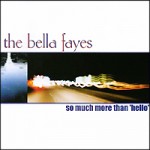 The Bella Fayes
The Bella Fayes
So Much More Than Hello
Siren Music Co.
Here’s a great work by an important new band. Singer/songwriter Lael Alderman quickly blew through the local scene a few years back. Almost immediately he penned a deal with Geffen Records that has as yet to amount to a hill of beans. To form the Bella Fayes, the talented Alderman recruited bassist Davey Hall from Thrillbilly, guitarist Adam Wayne and drummer Shane Fisher from the band Drive and keyboardist/guitarist Jason Henry from the band Architecture; as well as Gregg Williams to produce the project
The lead track, “Hello” is a pop masterpiece, replete with rounds of Beatlesesque vocal harmonies. Very catchy. “White Noise” struts to the high wail of a harmonica, while crunching, vibrato heavy guitars rattle through the verses. “Weedtown Hero” heads off into Americana territory, building slowly, from a slack-keyed banjo intro to a glorious fiery crescendo; expertly tracking Alderman’s impeccable vocal delivery.
Henry’s synth glissades gracefully play against Wayne’s jagged guitar ornamentations on “Fairweather Friend,” as Lael intones a rhetorical lyric. “Call it unpredictable/Call it in the air/because I won’t be there/I’m sorry but it’s true/The sun shines on me more than it shines on you/so I won’t be there.”
Henry’s plaintive piano figure sets one key structure “The Road Song,” that the guitars alter dramatically upon their entrance into the sonic picture. Alderman’s creaking craggy voice calls Bono to mind, as he etches the lyrics with a sense of weary regret.
Wayne’s buoyant guitar filigrees play against Hall’s fluid basslines on “Sorry,” as Henry adds well-placed synth flourishes to the thick brace of guitars, while Alderman adds his confidently sophisticated vocal presentation over Fisher’s sure 3/4 beat. A brilliant duet between Henry and Wayne concludes the tune.
Lael Alderman is a genuine talent of the highest order. Here he is backed by versatile, receptive sidemen, who lend each song great depth and power. The only thing anyone could ask from this band is to record more of the same as soon as possible. Six songs is just not enough.
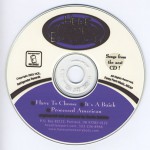 Here Comes Everybody
Here Comes Everybody
Demo
Refrigerator Records
For the better part of the past twenty years, drummer/vocalist Michael Jarmer and his wife, keyboardist/percussionist Rene Ormae-Jarmer have been subjecting our fair city to their own particular brand of quirky, intelligent Pop music. Michael’s abstract, non sequitur lyrics are often impenetrable, but never less than clever and entertaining. His vocal melodies are generally challenging and slightly out of the ordinary.
The Jarmers have been through a few guitarists and bassists in their day. Here, it would appear that the couple are between players. It seems that the three songs presented here are the work of Michael and Rene alone, although there may be an unnamed bassist involved as well. The songs themselves are different from any the Jarmers have released before. They are more honest and direct, less emotionally remote than HCE’s past endeavors.
Apparently Michael went through an emotionally tough period in the recent past. His songs reflect a sense of introspective maturity heretofore uncharted. They are more accessible. Jarmer is still fond of inanimate objects. But his affection for an inherited old car seems far more genuine than that professed in the past for a blue refrigerator.
Likewise, whereas in the past, Michael’s musical frames of reference were David Byrne and Adrian Belew, now it seems to be the Beach Boys (in the Pet Sounds era), the Beatles and latter-period XTC. “Have To Choose” contends with the choices in life with which people are confronted. To choose one thing means to sacrifice another. A lovely chorus, accented by Rene’s choppy piano accompaniment lends the song a strong sense of pathos.
“It’s A Buick” rides an uplifting Partridgian/McCartney-like melody in the chorus ”It’s been a sad year/But the Buick is going to drive me around,” over driving Nilssonish block piano chords in the upper register. The verses contend with telling the story: “Grandpa died in ‘85/He left us this old car/It runs pretty well/ but it costs a lot to fill/It’s A Buick, Buick La Sabre/Sometimes I think I see him there /in the passenger’s seat/He’s just killing time with me/listening for the speedometer alarm/in his ‘66 Buick/Buick Le Sabre.” A pretty Beach Boys inspired expansion of the chorus ensues, reminiscent of McCartney’s “Back Seat Of My Car” from Ram.
Rene’s electric piano riff is the fulcrum, as a fat, fuliginous bassline bounces across the balance. Michael enters with a cheery verse, imploring someone to “make me as cake/with lots of icing to waste.” A sweet confection. A popular commodity. The memorable chorus puts it all into perspective. “These days were processed American/We can’t tell ourselves from the imitation of ourselves/Who would know?” Rene’s simple yet imaginative keyboard stylings help add to the depth of the arrangement, here and in the other songs.
It would seem that Michael Jarmer has graduated to the next stage as a songwriter. He certainly has not abandoned his penchant for erudition and obscurity. But he is more accurate and precise with his words, more available from a melodic standpoint. Without pushing it into the mainstream exactly, these aspects of growth have moved Here Comes Everybody toward greater recognition and acceptance.
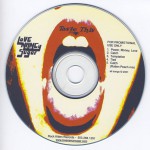 Love Nancy Sugar
Love Nancy Sugar
Taste This
Rock Kitten Records
Singer/songwriter Gina Noell is a longtime veteran of the local scene. Over the years, she has developed her talents as a vocalist and songwriter. The growth she displayed in last year’s Ever Clearly was especially critical in that Gina appeared to turn a corner in her development as a musician. Taste This features four songs (with a remix of the second song, “Catch,” added), executed by Gina and yet another band of backing musicians.
Gina has been through more musicians than the local union, in her never-ending quest for perfection. With the new lineup of drummer Stewart Moore, lead guitarist Dave Pakula, rhythm guitarist Jason Carter and bassist Alex Wiener, she may have finally hit the mark. Moore and Wiener work well in the rhythm section, while Pakula and Carter interweave selectively sparse, well-defined guitar parts.
“Power, Money, Love” is a fine illustration of their approach. Over Moore and Wiener’s fluid rhythm, Pakula adds a fulgurant guitar figure, while Carter interjects occasional jagged chords. Gina lends the verses a sense of mystery, while becoming more urgent in the chorus. The first version of “Catch” is an exotic dance, driven by acutely penetrating guitars and Gina’s powerful vocal delivery. Pakula’s fiery solo at the break smolders with subdued passion.
Wiener triggers an insistent percussive tone for the intro to “Temptation.” It’s a simple song in the verses, decorated by Pakula’s chiming guitar figure. But the chorus, wherein Gina spells out the title, as the guitars insistently punch a solid rhythm, shines. “Tied” begins with a snaky arrangement reminiscent of the Pretenders’ “Brass In Pocket,” but lacks a strong chorus to be truly memorable.
The remix of “Catch” features extensive use of samples, which propel the band into quite a different musical direction. While the mix is not entirely successful (there are a few rough spots in the transitional sections), it points to the possibilities which this version of the band is capable of achieving.
Gina Noell continues to show development with Love Nancy Sugar, seeking a voice and style that is all her own. With every new recording she seems nearer her goal. An open mind and an ongoing spirit of experimentation, offer her the flexibility to grow as a performer. She clearly exhibits that growth here.
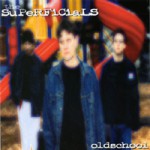 The Superficials
The Superficials
OldSchool
Daylight Basement records
Michael Page and Josh Millman fronted the Mavens in the late ‘90s, writing crisp pop songs that echoed of folk-rock roots, somewhat along the lines of the Rembrandts. The duo return here, with fellow multi-instrumentalist Mark Kent, to fashion smart pop songs, which still occasionally ring of the Rembrandts, but of Crowded House, Marshall Crenshaw and Matthew Sweet as well.
A distinct Todd Rundgren influence can be detected on Page’s “Pity,” whose b-section sounds uncannily like Rundgren’s “I Saw The Light.” With Beatlesesque vocal harmonies (including ooh-la-la-las and call-and -response voices) floating through the mix, the Superficials have their retro bases covered. “Cosmopolitan Daydream” and “Gone” are pages right out of Crenshaw’s book. Millman’s “Escape” sounds like Neil Finn, mid-period Crowded House.
Page’s “Engraved,” catchy, with a snappy beat over jangling acoustic guitar, could pass for the mellower side of Stone Temple Pilots. Very nice stuff. “Pretty Girls” sounds like an Elvis Costello tune, circa This Year’s Model, a whining, Steve Naive-like Farfisa line coiling through the verses. Page and Millman combine for the rousing “Dopamine,” an apparent electric 12-string guitar ringing behind the vocals, while storming tom-toms thunder like a stampeding herd of buffalo. The guitar solo in the middle is a scorching update of the riff to Barrett Strong’s “Money.”
Millman’s Lennon-flavored “Blue Sky” is a pretty ballad that benefits from exquisite harmony vocals. Millman and Kent’s “Livin’ Large” sounds like an authentic vinyl LP from 1964, copping the tack piano sound and mood of Phil Ochs’ classic “Small Circle Of Friends.” In reality it’s kind of a sappy number. “It’s Over Now” reprises the sort of Rembrandts sound that won for that band the opportunity to record the theme song for the TV series “Friends.”
The Superficials irrepressible Sunny Jim good nature is very-well expressed through the sharp songwriting and terrific execution evidenced here. However, the Beatles were great as songwriters because they had the cynicism of Lennon to offset the sweetness and light of McCartney. Without a similar set of checks and balances, the Superficials threaten the pancreas of anyone who listens, with insulin shock being the end result.
There was a brief time in the mid-’60s, when bands such as the Lovin’ Spoonful and the Monkees ruled the radio airwaves. The ravaging effects of the Viet Nam war had yet to enter the consciousness of the average pop music lover. It was a golden era. The Superficials recreate that era so perfectly, they are like a musical time machine. It’s too bad there is not a radio station that plays “new oldies.” For if there were such a station, the Superficials would rule the charts.
 Demi-dryer
Demi-dryer
Empty Space
Self-Produced
and
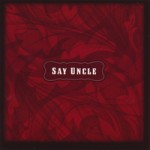 Say Uncle
Say Uncle
Say Uncle
Self-Produced
While the lead vocalists for these two bands sound nothing alike, and while the backing musicians for both display great chops and a high degree of musical precision, the two bands share a common flaw. Neither band is to be written off. There is nothing so wrong with either organization that time and experience won’t fix. But, as for now, something is not quite right.
Singer/songwriter Rachel Browning is the prime mover of Demi-Dryer. Christopher Beeson accents her songs with a tasteful array of guitar sounds, from chunky rhythm to roiling slide guitar. For this project, the duo hired local pro Carlton Jackson to handle the drum duties. Browning’s songs are as dry as a tumbleweed in a windstorm on the prairie, reminiscent in energy of Margo Timmins and Cowboy Junkies. Her voice is a lilting contralto, similar in timbre to that of Sinead Lohan.
Young Teisha Helgerson, the lead singer for Say Uncle, is accompanied by family members Jon Helgerson on bass and Dave Helgerson on guitar. Drummer Glenn Matz and keyboardist Jeff Simonson round out the quintet. Their sound tends toward blues tinged rock. Teisha has a powerful, polished voice. The band are each accomplished musicians on their own.
There is no question that both bands, deservedly, have their rabid fans. But the fact remains that what holds each back is the songwriting. This is not to say the songwriting is not competent. Both units display creative talent. But, in the case of Rachel Browning, her material is so bland and gray that is difficult to find colors in the mix, only shades. The songs Teisha Helgerson sings nicely suit her voice, but they are so derivative they are nearly predictable.
Browning needs material that pushes her rich, beautiful voice, while eliciting from her deeper, more emotionally direct lyrics. Helgerson needs songs and arrangements that are more cutting edge, ala Nellie Furtado or India Arie. She is too young to be relegated to a blues cruise. Let her fly away like a bird. If these two singers can overcome the shortcomings in their material, there is no doubt that both have very bright futures ahead of them.
